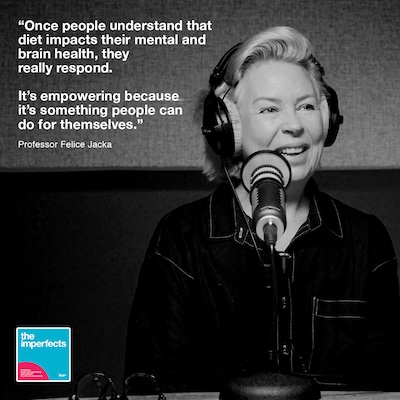How does food affect our mood? Does diet actually impact our mental health? What is a gut micro-biome, and can we still eat a few chips without ruining it?In this Academy of Imperfection episode, we are joined one of the worlds leading experts on the relationship between what we eat, and how it effects our mental health, Professor Felice Jacka.
And if can we trust anyone to get to the bottom of the vagus nerve ‘highway’; our hippocampus shrinking; our mitochondrial reaction to ultra-processed foods (don’t worry we didn’t know these words before either) – it’s her.
There was a lot to ‘digest’ in this chat (so to speak), but thankfully, there is so much we can do, by making informed choices about what we put in our bodies, to improve our mental health.
See below for links & research mentioned in this episode, information on Felice and her work and extra resources:
Things to read
The Food and Mood centre – https://bit.ly/3xdmkjw. Felice’s published research – https://deakin.au/3VWggpb, Felice’s shorter articles – https://bit.ly/3RvfeO2.
Felice’s recent research in Molecular Psychiatry Review –https://go.nature.com/3xozlqq.
SMILEs trial – https://bit.ly/3KLjGEL. Kevin Hall’s study on Ultra-Processed food – https://bit.ly/3z7akjY.
Brain Changer, Felice Jacka, https://bit.ly/3xpYGjJ, There’s a Zoo in my Poo, Felice Jack & Rob Craw https://bit.ly/3RrHxNd.
Previous Imperfects Episodes mentioned in this episode:
Tim Spector – https://link.chtbl.com/timspector.
This episode with Professor Felice Jacka includes a discussion about disordered eating. If this feels like too much for you right now, please come back to this episode when you’re feeling ready.
If you or someone you love is experiencing disordered eating, we recommend the following organisations:
The Butterfly Foundation https://bit.ly/48YCSZe
Eating Disorders Families Australia https://bit.ly/3TLU7J5
Uncovery https://bit.ly/3x4IOCO
The Imperfects is not a licensed mental health service and is not a substitute for professional mental health advice, treatment or assessment. The advice given in this episode is general in nature, but if you’re struggling, please see a healthcare professional, or call lifeline on 13 11 14.
